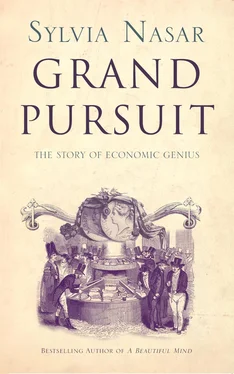Prologue Mr. Sentiment Versus Scrooge Contents Cover Title Page GRAND PURSUIT Sylvia Nasar THE STORY OF ECONOMIC GENIUS Dedication Preface: The Nine Parts of Mankind Act I: Hope Prologue: Mr. Sentiment Versus Scrooge Chapter I: Perfectly New: Engels and Marx in the Age of Miracles Chapter II: Must There Be a Proletariat? Marshall’s Patron Saint Chapter III: Miss Potter’s Profession: Webb and the Housekeeping State Chapter IV: Cross of Gold: Fisher and the Money Illusion Chapter V: Creative Destruction: Schumpeter and Economic Evolution Act II: Fear Prologue: War of the Worlds Chapter VI: The Last Days of Mankind: Schumpeter in Vienna Chapter VII: Europe Is Dying: Keynes at Versailles Chapter VIII: The Joyless Street: Schumpeter and Hayek in Vienna Chapter IX: Immaterial Devices of the Mind: Keynes and Fisher in the 1920s Chapter X: Magneto Trouble: Keynes and Fisher in the Great Depression Chapter XI: Experiments: Webb and Robinson in the 1930s Chapter XII: The Economists’ War: Keynes and Friedman at the Treasury Act III: Confidence Prologue: Nothing to Fear Chapter XIII: Exile: Schumpeter and Hayek in World War II Chapter XIV: Past and Future: Keynes at Bretton Woods Chapter XV: The Road from Serfdom: Hayek and the German Miracle Chapter XVI: Instruments of Mastery: Samuelson Goes to Washington Chapter XVII: Grand Illusion: Robinson in Moscow and Beijing Chapter XVIII: Tryst with Destiny: Sen in Calcutta and Cambridge Epilogue: Imagining the Future Notes Index Picture Section Acknowledgments About the Author Also by Sylvia Nasar Credits Copyright About the Publisher
It was the worst of times.
When Charles Dickens returned from his triumphant American reading tour in June 1842, the specter of hunger was stalking England. 1The price of bread had doubled after a string of bad harvests. The cities were mobbed by impoverished rural migrants looking for work or, failing that, charity. The cotton industry was in the fourth year of a deep slump, and unemployed factory hands were forced to rely on public relief or private soup kitchens. Thomas Carlyle, the conservative social critic, warned grimly, “With the millions no longer able to live . . . it is too clear that the Nation itself is on the way to suicidal death.” 2
A firm believer in education, civil and religious liberty, and voting rights, Dickens was appalled by the upsurge in class hatred. 3In August a walkout at a cotton mill turned violent. Within days the dispute had escalated into a nationwide general strike for universal male suffrage, called by leaders of a mass movement for a “People’s Charter.” 4The Chartists had taken up the principal cause of middle-class Radicals in Parliament—one man, one vote—into the streets. The Tory government of Prime Minister Robert Peel promptly dispatched red-coated marines to round up the agitators. Rank-and-file strikers began drifting back to their factories, but Carlyle, whose history of the French revolution Dickens read and reread, warned darkly that “revolt, sullen, revengeful humor of revolt against the upper classes . . . is more and more the universal spirit of the lower classes.” 5
In the glittering London drawing rooms where lords and ladies lionized him, Dickens’s republican sympathies were as hard to overlook as his garish ties. After running into the thirty-year-old literary sensation for the first time, Carlyle described him patronizingly as “a small compact figure, very small,” adding cattily that he was “dressed a la D’Orsay rather than well”—which is to say as flash as the notorious French count. 6Carlyle’s best friend, the Radical philosopher John Stuart Mill, was reminded of Carlyle’s description of a Jacobin revolutionary with “a face of dingy blackguardism radiated by genius.” 7At fashionable midnight suppers the Chartist “uprising” provoked bitter arguments. Carlyle backed the Prime Minister who insisted that harsh measures were necessary to keep radicals from exploiting the situation and that the truly needy were already getting help. Dickens, who swore that he “would go farther at all times to see Carlyle than any man alive,” 8nonetheless maintained that prudence and justice both demanded that the government grant relief to the able-bodied unemployed and their families.
The Hungry Forties revived a debate that had raged during the famine years, 1799 to 1815, of the Napoleonic Wars. At issue was the controversial law of population propounded by the Reverend Thomas Robert Malthus. A contemporary of Jane Austen and England’s first professor of political economy, Malthus was a shy, softhearted Church of England clergyman with a harelip and a hard-edged mathematical mind. While still a curate, he had been tormented by the hunger in his rural parish. The Bible blamed the innate sinfulness of the poor. Fashionable French philosophers like his father’s friend the Marquis de Condorcet blamed the selfishness of the rich. Malthus found neither explanation compelling and felt bound to search for a better one. An Essay on the Principle of Population, published first in 1798 and five more times before his death in 1834, inspired Charles Darwin and the other founders of evolutionary theory and prompted Carlyle to dismiss economics as the “dismal science.” 9
The fact that Malthus sought to explain was that, in all societies and all epochs including his own, “nine parts in ten of the whole race of mankind” were condemned to lives of abject poverty and grinding toil. 10When not actually starving, the typical inhabitant of the planet lived in chronic fear of death by hunger. There were prosperous years and lean ones, richer and poorer regions, yet the standard of life never departed for long from subsistence.
In attempting to answer the age-old question “Why?” the mild-mannered minister anticipated not only Darwin but Freud. Sex, he argued, was to blame. Whether from observing the wretched lives of his parishion-ers, the influence of natural scientists who were beginning to regard man as an animal, or the arrival of his seventh child, Malthus had concluded that the drive to reproduce trumped all other human instincts and abilities, including rationality, ingenuity, creativity, even religious belief.
From this single provocative premise, Malthus deduced the principle that human populations tended always and everywhere to grow faster than the food supply. His reasoning was deceptively simple: Picture a situation in which the supply of food is adequate to sustain a given population. That happy balance can’t last any more than could Adam and Eve’s tenure in paradise. Animal passion drives men and women to marry sooner and have bigger families. The food supply, meanwhile, is more or less fixed in all but the very long run. Result: the amount of grain and other staples that had just sufficed to keep everyone alive would no longer be enough. Inevitably, Malthus concluded, “the poor consequently must live much worse.” 11
In any economy where businesses compete for customers and workers for jobs, an expanding population meant more households contending for the food supply, and more workers competing for jobs. Competition would drive down wages while simultaneously pushing food prices higher. The average standard of living—the amount of food and other necessities available for each person—would fall.
At some point, grain would become so expensive and labor so cheap that the dynamic would reverse itself. As living standards declined, men and women would once again be forced to postpone marriage and have fewer children. A shrinking population would mean falling food prices as fewer households competed for the available food. Wages would rise as fewer workers competed for jobs. Eventually, as the food supply and population moved back into balance, living standards would creep back to their old level. That is, unless Nature’s “great army of destruction” 12—war, disease, and famine—intervened to hurry the process, as happened, for example, in the fourteenth century, when the Black Plague wiped out millions, leaving behind a smaller population relative to the output of food.
Читать дальше












